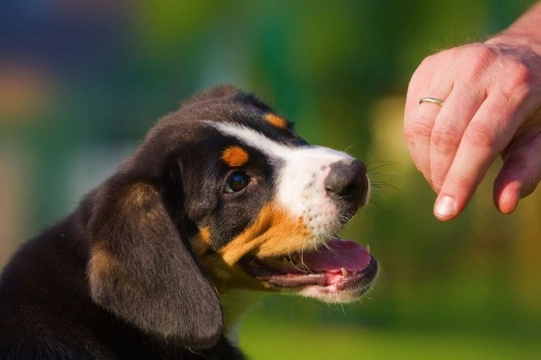
Bite inhibition - how to stop your puppy from biting
Anyone who has ever owned or played with a puppy will understand that the puppy grabbing hold of your hand with their teeth or biting lightly in play is a normal part of development, although those needle-sharp puppy teeth can often be painful even when used in play! Biting is not always an aggressive behaviour, and dogs and particularly puppies use their mouths and teeth to explore the world around them and learn about taste, texture and communication. When playing with their littermates and learning about socialisation with their mother and other dogs, puppies begin to learn about the process of bite inhibition, and how to play nicely with others. In time, this means that your puppy, when correctly trained and handled, should outgrow the biting instinct altogether in safe and non-threatening play situations.
Bite inhibition and how it develops
Bite inhibition is the learning process by which puppies begin to understand that biting and causing pain is bad, and can come in the forum of a firm put-down from their mother or another adult dog, or from the pained yelp that their littermates will give when biting goes too far. However, if a puppy does not learn sufficient bite inhibition or how to moderate their own behaviour with regards to their teeth and how they use them, many problems can develop further down the line. All dogs are considered to have a ‘bite inhibition threshold,’ which is an indicator of how quick they are to respond with their teeth! A dog with a low bite inhibition threshold is one that will snap or bite relatively easily, whereas a dog or puppy with a higher threshold will be much less likely to resort to biting in play or for attention. As a puppy grows up and learns about the world around them, their bite inhibition threshold should increase exponentially. Feeding treats by hand and teaching your puppy not to snap for the food but to take it gently is a good way of helping bite inhibition to develop, as is allowing play and socialisation with other dogs of a similar age, who will learn from each other by the responses that they elicit when they go too far!
Reacting to a bite
While the development of bite inhibition is something that occurs naturally in puppies as they get older, how you react or don’t react to biting and nipping can have a great impact on the feedback process that your puppy’s behaviour elicits, and how they behave with regards to biting in the future.
- If your puppy snaps or grabs your hand with their teeth, do not jerk your hand back. Not only might this cause an injury that could possibly have been avoided, but it will encourage your puppy to think that you are playing, and possibly cause them to snap again.
- Be still, stop whatever game is in the offing or what you are doing, and say ‘no’ or ‘leave!’ sharply. Remain still until your puppy has released their hold.
- Puppies learn when they are going too far with other dogs by eliciting a yelp response to a bite, and so with younger dogs, ‘yelping’ can be a good way to let your puppy know that they have hurt you and cause them to immediately release their hold.
Ways to curb biting
If your puppy doesn’t seem to be learning bite inhibition very fast, or is particularly snappy and unable to differentiate between a soft play bite and one that might cause damage or harm, there are a few ways that you can address this.
- Redirecting your puppy’s attention can soon cause them to release their hold on you or to stop snapping and play-grabbing at you. A squeaky toy, something that you can throw, or another unusual diversion can be useful to keep to hand for this reason.
- Do not use aversive methods or negative reinforcement, such as spraying water or forcing your hand into your puppy’s mouth. Not only is this behaviour not something that they can decode or understand, as it does not happen in the wild, but it can cause a worse bite or reaction due to fear or discomfort.
- Calming your puppy down when play has become too overzealous is a good way to ensure that your pup doesn’t forget their manners. Training, responsiveness to commands and bite inhibition can all go out of the window if your puppy is over stimulated or over excited, so try to keep an eye on things and stop before it gets to this point, plus learn how to calm your dog down if they get worked up into a frenzy.
- Putting your dog on a time out when they refuse to respond to commands not to bite, or to calm down when overexcited is a good method of administering feedback to your dog about bite inhibition and good manners. If your puppy learns that biting means the end of play and attention, they will soon learn not to act out in order to extend the game. A time out means removing toys or the play environment from your dog until they have calmed down and can play nicely, but should not mean shutting them into their crate or kennel. While your puppy is at the age that they are developing bite inhibition, they will also more than likely be learning about crate training and their territory, and so it is important not to build up any negative associations for them with this in order to avoid problems down the line.



